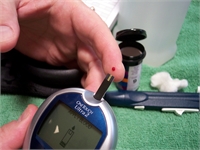
Avoiding the Complications of Diabetes as We Age
Important Notice: Our web hosting provider recently started charging us for additional visits, which was unexpected. In response, we're seeking donations. Depending on the situation, we may explore different monetization options for our Community and Expert Contributors. It's crucial to provide more returns for their expertise and offer more Expert Validated Answers or AI Validated Answers. Learn more about our hosting issue here.

Avoiding the Complications of Diabetes as We Age
You must be logged in to post a comment.
According to the American Association of Diabetes Educators, nearly 26 million Americans with diabetes and nearly 79 million more with pre-diabetes, now face vital lifestyle changes if they hope to avoid serious complications including heart disease or stroke, kidney disease, nerve damage, vision loss (or blindness), or amputation. Because while diabetes is certainly a serious condition at any age, many individuals with this disease fail to recognize the need to be increasing vigilant in managing diabetes as they age or face numerous complications.
Indeed, adjustments — both small and large — need to be an ongoing reality for diabetes sufferers, a constant process of behavioral changes ever-adaptive to assuring patterns of proper eating and effective activity, while adhering to new monitoring technology and medication-taking routines. As we age, it’s all too easy — and common — to fall into lifestyle patterns that can foster any number of life-threatening complications. Thus, diabetes educators suggest establishing self-care strategies that are adaptive to your health needs as you age, providing the constant oversight this life-changing disease requires.
Here are a few points that should be incorporated into any long-term strategy:
> Learn to maintain a healthy diet by getting in the habit of reading food labels, paying special attention to nutritional content and portion sizes. Not only from the diabetes-management perspective, it pays to know what you’re putting into your body.
> Recognize the importance of remaining physically active and consciously plan ahead to activities you can enjoy either alone, with a loved one or friend, or perhaps as part of a group. Such activities often lead to new avenues to enjoy family and friends.
> Be vigilant in checking and recording your blood glucose levels, as well as other numbers important to diabetes management. It may sometimes seem simplier to delay or avoid testing, but it is never, ever wise.
> Do whatever is necessary to establish a routine to take your medications as prescribed, reminding yourself how they affect your body.
> As problems arise relating to eating, exercise, monitoring, or medications, devise strategies to identify the root of such problems and think creatively how to solve them. If need be, enlist help from friends or loved-ones in coming up with just the right answer. (There’s always an answer.)
> Identify the various potential risks your lifestyle choices can pose to your health, and then take the necessary steps to avoid them.
> Develop healthy and productive ways to deal with times when diabetes management becomes difficult. Enlist your doctor, loved-ones, friends, even neighbors to help you cope if necessary. Sometimes, two — or more — heads really are better than one.
As the American Association of Diabetes Educators points out, those with diabetes and pre-diabetes need to remind themselves that diabetes isn’t one of those diseases you can just take a pill for in the morning and then forget about it. To avoid the many serious and often deadly complications that can arise from diabetes mismanagement, every need must be met–proper diet, ongoing activity, meticulous monitoring, scheduled medication, learning to problem-solve, learning to avoid unnecessary risks, and acquiring healthy coping skills.
And in that diabetes requires constant supervision of diet and other essential factors, it’s important not to become complacent as we age. Recognize that what was effective at 30 years of age might not be so effective at 50–and even less so at 65. Realize not just that you have particular needs to be met in managing diabetes, but that those needs require constant adaptation as you age.